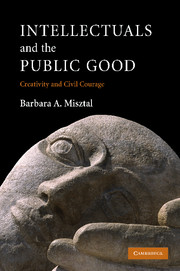Book contents
- Frontmatter
- Contents
- List of tables
- Acknowledgements
- Introduction
- Part I Theoretical framework
- 1 The authority of public intellectuals
- 2 Creativity: the problem of the new
- 3 Courage: acting on conviction
- 4 Typology of engagements
- Part II Public intellectuals: the case of the Nobel Peace Prize laureates
- Conclusion
- References
- Index
4 - Typology of engagements
Published online by Cambridge University Press: 22 September 2009
- Frontmatter
- Contents
- List of tables
- Acknowledgements
- Introduction
- Part I Theoretical framework
- 1 The authority of public intellectuals
- 2 Creativity: the problem of the new
- 3 Courage: acting on conviction
- 4 Typology of engagements
- Part II Public intellectuals: the case of the Nobel Peace Prize laureates
- Conclusion
- References
- Index
Summary
Intellectual marginality and creativity
The central aim of this chapter is to bring together the various sociological approaches to creativity and courage, and to propose a general typology of intellectuals' public involvement that, I hope, can advance our understanding of intellectuals' public practice. As we have already observed, the accounts of the social history of intellectuals in European and American political life often paint a contradictory picture. In some of them loneliness and marginalisation are seen as the prerequisites of creativity, while estrangement and alienation are presented as essential preconditions for intellectuals' progressive radicalism, and therefore trust in their courage. In other descriptions of intellectual life, however, intellectuals are shown as well-integrated members of vibrant communities, in which collaboration and gift-like exchanges flourish. My aim is to examine sociological approaches to intellectual creativity and intellectuals' stance vis-à-vis the public so as to suggest much-needed alternatives to both: to the stereotype of the creator as a marginalised genius and to the presentation of intellectuals as engaged radicals.
The image of the intellectual as a detached, estranged outsider owes much to the Romantic concept of creativity as being located in the atelier of the artist and as being an expression of artists' inner feelings.
- Type
- Chapter
- Information
- Intellectuals and the Public GoodCreativity and Civil Courage, pp. 88 - 106Publisher: Cambridge University PressPrint publication year: 2007



